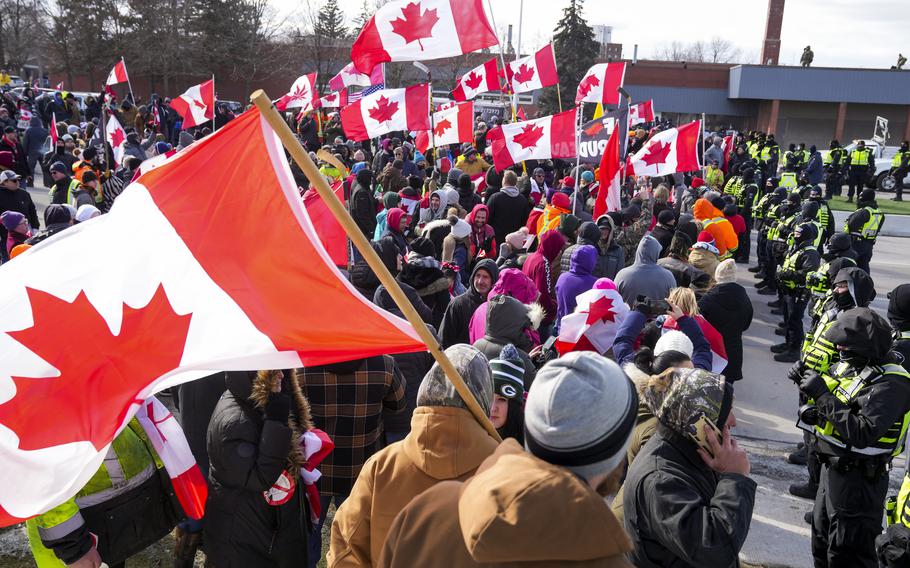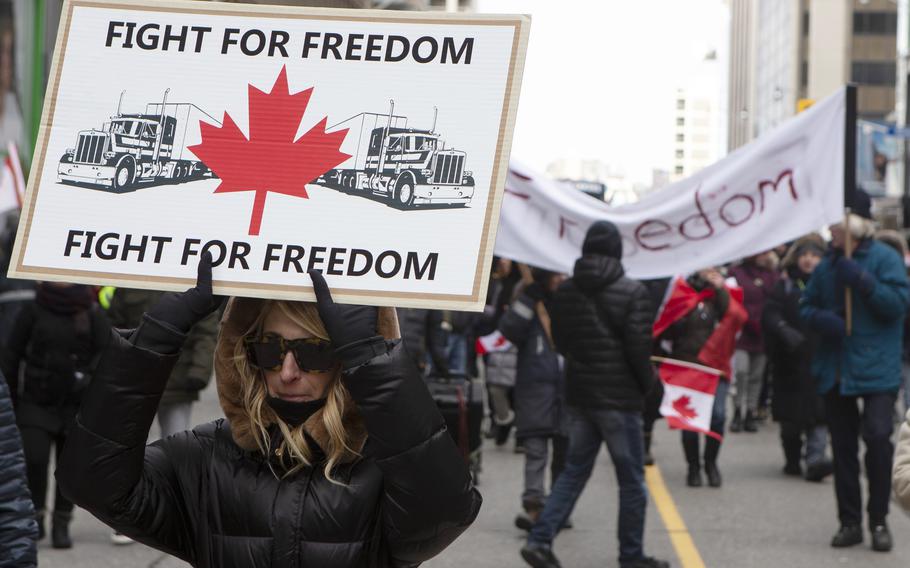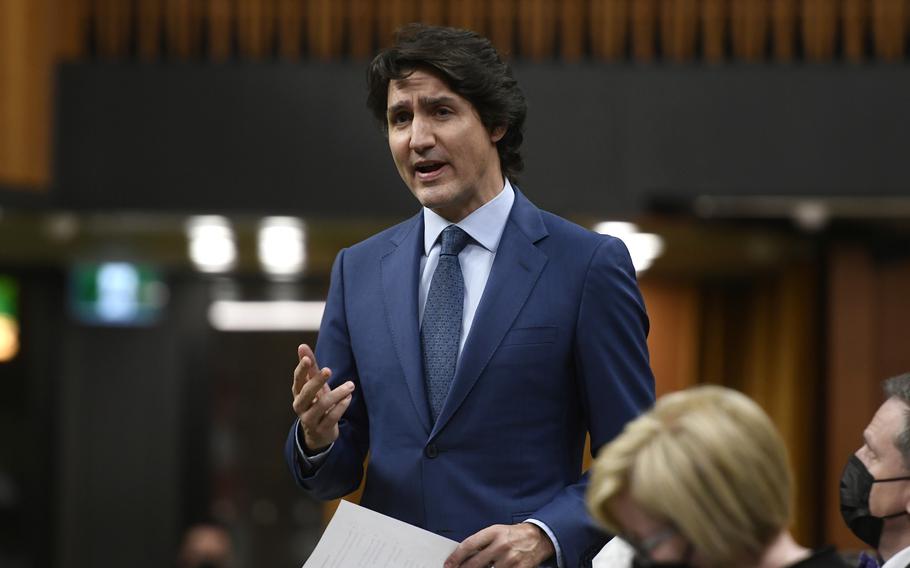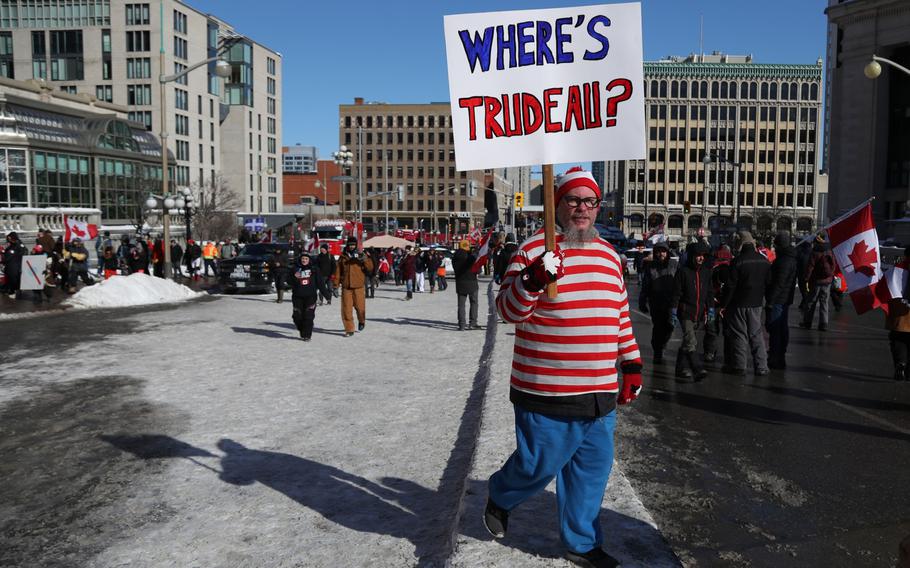Americas
Police prepare to clear Ontario border bridge; tear gas used on Paris crowd
The Washington Post February 12, 2022

Police officers hold a line as protesters march in Windsor, Ontario, on Saturday, Feb. 12, 2022. The demonstrations at the Ambassador Bridge, downtown Ottawa and elsewhere have targeted vaccine mandates and other coronavirus restrictions and vented fury toward Prime Minister Justin Trudeau, who has called the protesters just a “fringe” element of Canadian society. (Nathan Denette/The Canadian Press via AP)
Stars and Stripes is making stories on the coronavirus pandemic available free of charge. See more stories here. Sign up for our daily coronavirus newsletter here. Please support our journalism with a subscription.
OTTAWA - Canada's capital saw another influx Saturday of anti-government and anti-vaccine mandate protesters for a third straight weekend, while police in Ontario moved in to clear demonstrators partially blocking a vital U.S.-Canada border crossing in defiance of an injunction ordering them to leave.
Police in Windsor, Ontario, said Saturday morning they had "commenced enforcement" at the Ambassador Bridge, a key trade corridor to Detroit. By late morning, police had begun steadily pushing protesters away from the bridge.
Across the Atlantic, French protesters, galvanized by their Canadian counterparts, temporarily blocked the fabled Champs-Élysées, a central artery in Paris, despite an order banning them from entering the capital.
Ottawa Police Chief Peter Sloly told reporters Friday that intelligence suggested the total number of trucks and demonstrators would be similar to that of last weekend, when about 5,000 people and 1,000 trucks flooded the city.
"Our message to you is: Do not come," he said. "And if you do commit unlawful acts, there will be consequences."
It was one of several warnings issued Friday to protesters of the self-styled "Freedom Convoy," which has paralyzed the capital city. Protesters have blockaded several U.S.-Canada border crossings and inspired similar protests abroad.
Protesters turned out anyway.
Police officers by the Ambassador Bridge on Saturday stood in a line in front of blockaders on one side, while some police vehicles were stationed on the opposite side. They were accompanied by buses, including a school bus, and ambulances.
"The Windsor Police & its policing partners have commenced enforcement at and near the Ambassador Bridge. We urge all demonstrators to act lawfully & peacefully," the force wrote on Twitter.
Some vehicles began moving away from the area, while demonstrators on foot displayed the Canadian flag and sang the country's national anthem, chanting "Freedom!" periodically. Protesters began dismantling tents at the site and packing up grilling supplies.
A wall of police officers slowly pushed protesters away from the bridge, warning that demonstrators would be arrested if they did not leave.
No arrests have been made thus far, police said. A tow truck removed one vehicle from the area, which police later clarified was done at the operator's request due to mechanical issues.
"We appreciate the cooperation of the demonstrators at this time and we will continue to focus on resolving the demonstration peacefully," the Windsor Police wrote on Twitter.
But more people on foot had swelled the protesters' ranks by early afternoon, with demonstrators appearing to outnumber police officers, according to reporters from the Canadian Broadcasting Corp. News, Canada's public broadcaster.
Ontario Premier Doug Ford called the blockade a "siege" and declared a provincial state of emergency on Friday, warning protesters of "severe" consequences, including fines up to $78,500 and prison terms. He said he would convene a provincial cabinet on Saturday to urgently enact measures to make it "crystal clear" that it is illegal to block critical infrastructure.

Protesters march in Toronto to voice their opposition to COVID-19 vaccine mandates on Saturday, Feb. 12, 2022. The demonstrations at the Ambassador Bridge, downtown Ottawa and elsewhere have targeted vaccine mandates and other coronavirus restrictions and vented fury toward Prime Minister Justin Trudeau, who has called the protesters a “fringe” element of Canadian society. (Chris Young /The Canadian Press via AP)
Toronto police blocked portions of key roadways to prevent protester vehicles from reaching downtown Toronto. Police also said demonstrators would not be allowed to transport fuel cans downtown.
Still, hundreds of demonstrators gathered on the grounds of the Ontario legislature Saturday, Canadian television network Global News reported - even as the city issued an extreme cold weather alert. Temperatures were expected to dip down to 5 degrees Fahrenheit Saturday night.
Video on social media showed throngs of protesters marching down Toronto's streets, chanting and holding signs.
In Nova Scotia, protesters on Saturday blocked the Marine Atlantic Terminal in North Sydney - the launch point for important ferry routes to Canada's easternmost provinces.
In Paris, French protesters blocking parts of the Champs-Élysées on Saturday cut off traffic on parts of the capital's most recognizable avenue and the roundabout that encircles the Arc de Triomphe.
The protesters made it into central Paris, despite an order banning them from entering the capital and the deployment of more than 7,000 police officers. Authorities said earlier in the day that they had prevented 500 vehicles from entering and had penalized hundreds of people.
Police appeared to fire tear gas to disperse protesters on the central Parisian luxury shopping boulevard. Demonstrators honked horns from vehicles with slogans demanding an end to the country's vaccine pass.
Most cars had left the boulevard by early evening local time, but the standoff between police and protesters on foot continued.
Similar convoys also headed to other European cities on Saturday. In the Netherlands, traffic came to a standstill in parts of The Hague, the seat of the Dutch government. Officials in the Belgian capital of Brussels were bracing for convoys that may arrive there on Monday, despite an entry ban.

Prime Minister Justin Trudeau rises during Question Period in the House of Commons on Parliament Hill in Ottawa on Thursday, Feb. 10, 2022. (Justin Tang /The Canadian Press via AP)
Canadian Prime Minister Justin Trudeau, who has previously ruled out mobilizing the military to break up the protesters, on Friday vowed an "increasingly robust police intervention," adding, "Everything is on the table, because this unlawful activity has to end, and it will end."
None of this seemed to perturb the protesters, who have also targeted border crossings in Manitoba and Alberta, as well as Sarnia in Ontario. As the court deadline passed at 7 p.m. Friday, the number of protesters diminished at the Ambassador Bridge, but many chose to defy the order.
Windsor Police issued a statement Friday to protesters still on the bridge "providing notice," they said, that "the unlawful act of blocking streets at and near the Ambassador Bridge" could put demonstrators at risk of facing criminal charges, arrest and the seizure of their vehicles.
"Charges and/or convictions related to the unlawful activity associated with the demonstration may lead to denial in crossing the USA border," the police statement added.
Ambassador Bridge is a crucial conduit for the auto industry on both sides of the border, and the blockade has disrupted auto plants as far away as Alabama.
At least five automakers - Ford, GM, Honda, Chrysler's parent company, and Toyota - have experienced production disruptions at their U.S. or Canada plants because of the protests, according to news reports.
The U.S.-based Alliance for Automotive Innovation, an industry group whose members include Honda, Toyota and BMW, underscored that the auto industry supports about 10 million jobs in America, and said the organization and its members were engaged in building "supply chain solutions" and mitigating short-term disruptions as a result of the crisis in Canada.
Ottawa officials said Friday that the city would seek its own injunction "to address the actions of the protesters," but a hearing has not yet been set. Demonstrators fist-pumped on Wellington Street, a main thoroughfare in front of Parliament, on Friday night to a DJ's tunes. They continued to bring in fuel - and a big screen.
"These unlawful demonstrators are executing a very complex, very fluid, very sophisticated operation," police chief Sloly said.
Ottawa police called for reinforcements this week, saying they lacked the resources to dismantle the protests.
Trudeau told reporters on Friday that the federal government has provided hundreds of police officers to jurisdictions that require them, including Ottawa. He said he didn't accept the contention that the city of Ottawa had "exhausted its tools and its resources."
Diane Deans, a city councilor who chairs the Ottawa Police Services Board, said Friday that Trudeau's comments were "a little unfair."
"There are a lot of people that think the federal government [has] been too late to recognizing this is a national crisis," she said.

A protester carries a sign during the “Freedom Convoy” demonstration in Ottawa on Feb. 5, 2022. (David Kawai/Bloomberg)
The Ottawa Police Service said in a news release Saturday that officers were overwhelmed by aggressive behavior from protesters Friday night but that the force "continues to deploy all available resources."
"We have a plan to end this unlawful occupation and await the necessary reinforcements to do so," the statement said.
As of Saturday morning, Ottawa police had made 26 arrests on criminal charges and issued more than 2,600 tickets, it added.
Protesters draped in Canadian flags stood in the snow in front of the parliament building on Saturday as horns blared from trucks despite a court order forbidding honking. The atmosphere was celebratory and defiant, with some demonstrators dancing along to upbeat music blasting from speakers. Children bundled in hats and coats held signs reading "Go Truckers." Police were scarce.
Hundreds of people joined a counterprotest on Saturday afternoon, marching in Ottawa and chanting "Whose streets? Our streets!" and "Hey hey, ho ho, this trucker convoy has got to go!"
Trudeau on Saturday was slated to chair a meeting of the incident response group, an emergency committee made up of some cabinet ministers and other senior officials, "on the ongoing illegal blockades," his office said.
The convoy started as a protest of U.S. and Canadian rules requiring truckers crossing the border to be fully vaccinated. But it has grown into a broader movement against pandemic restrictions - which are mostly imposed by the provinces - and the Trudeau government.
Officials have noted that 90% of Canadian truck drivers are fully vaccinated. The Canadian Trucking Alliance, a main industry group, has distanced itself from the protests. Many of the key organizers are not truckers but figures in fringe extremist and anti-government groups. Some protesters have flown Confederate flags or flags with swastikas on them, while some Ottawa residents say they've been intimidated, subjected to racist vitriol and harassed for wearing masks.
Troy Holman, a 32-year-old Windsor resident who has protested this week, told the Associated Press he believes the government overreached with its pandemic restrictions, which he said hurt his wife's small business.
"Unfortunately, we have to be here, because this is what's going to get the attention of the government," Holman said at the Ambassador Bridge, before the judge's ruling was announced.
Victoria Stecjuk, who made the six-hour journey from London, Ontario, to Ottawa for this weekend's protests, said she thought the state of emergency - and the frigid weather - would do little to deter demonstrators.
"We're going to keep coming, we're here in this weather, we're not going to stop," she told The Washington Post. "We're doing this to get our freedom back, and that's why we're here."
Protesters in the capital appeared skeptical that the police would crack down.
"We are a peaceful bunch. I don't believe the police are even going to make a move on this," Mike Cohen, from Montreal, said. "The police is not going to come here and arrest people when there's children here, there's the elderly, there's people of all nationalities."
Protesters have tapped into broader pandemic fatigue and benefited in part from foreign support. Trudeau said Friday after a call with President Joe Biden that at least 50% of fundraising for the convoy on some websites has originated from the United States.
Toronto-Dominion Bank said Saturday it had frozen two personal bank accounts into which more than $1 million had been deposited to support the convoy protesters, Reuters reported. TD asked Ontario's high court on Friday to take the funds and to either send them to the intended recipients or return them to donors.
Keith Wilson, a lawyer for the convoy, told Reuters that the protesters would seek a court order next week to release the donations to a new nonprofit organization set up to manage them.
Right-wing political figures in the United States continued to express support for the Canadian demonstrators. "Civil disobedience is a time-honored tradition in our country," said Sen. Rand Paul, R-Ky., in an interview with the conservative website Daily Signal. He added: "I hope the truckers do come to America."
Rep. Paul Gosar, R-Ariz., chimed in Friday in a tweet that criticized vaccine mandates and Trudeau, who has called the protests unlawful. "You know what's unlawful? Forcing private businesses close their doors," said the lawmaker, who also incorrectly referred to the vaccines as "experimental." (Coronavirus vaccine shots that have completed clinical trials and been approved by regulators are not experimental.)
Several other Canadian cities, including Toronto and Edmonton, were anticipating protests this weekend. Copycat demonstrations also took place in New Zealand and Australia, with thousands of protesters disrupting traffic and canceling a popular fair in Canberra on Saturday.
___
Jeong reported from Seoul. Suliman reported from London. The Washington Post's Rick Noack contributed reporting from Paris. Zoeann Murphy contributed reporting from Ottawa.